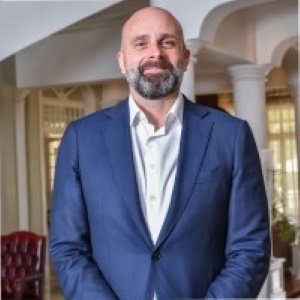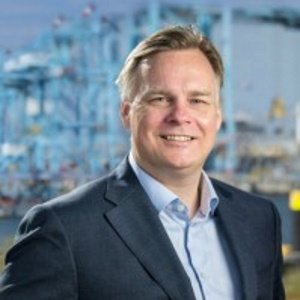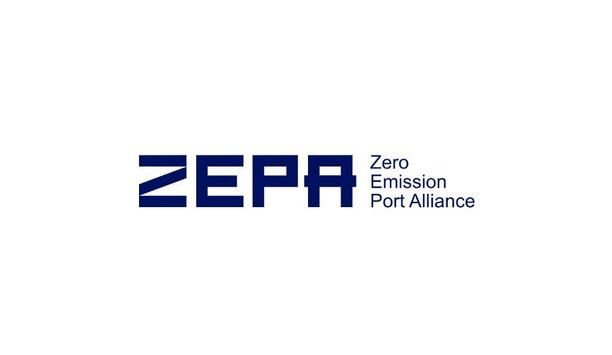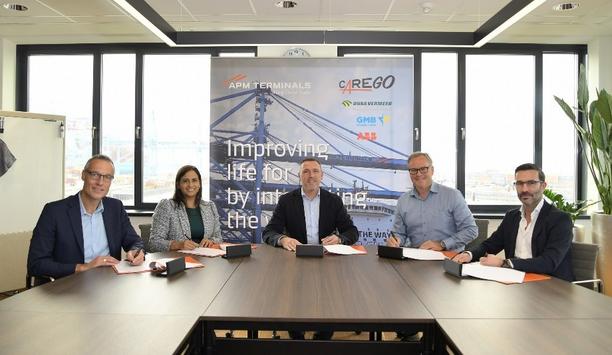APM Terminals - Experts & Thought Leaders
Latest APM Terminals news & announcements
As ZEPA continues to create awareness and adoption of decarbonisation solutions across the global container port industry, the alliance is pleased to welcome new leading port industry members, including Ampcontrol, Kalmar and PSA Antwerp. The group now has 14 members with the expectation that additional members will join in the coming months. Adoption of BE-CHE ZEPA has already identified significant demand within the industry for BE-CHE and encouraged the take-up Together, this extended alliance has committed to the collective action needed to speed up port decarbonisation through the affordability and adoption of Battery-Electric Container Handling Equipment (BE-CHE). ZEPA has already identified significant demand within the industry for BE-CHE and encouraged the take-up of voluntary decarbonisation standard-setting, as well as recognising power grids as critical enablers. Four workstreams focusing on critical topics ZEPA also recently launched its 2025 Work Programme at the world’s pioneering maritime conference, TOC, in Rotterdam, which saw it renew its priorities to scale BE-CHE and introduce four workstreams focusing on critical topics that enable further BE-CHE adoption: Load profile scenario explorer: Improving decision-making for fleet electrification by assessing how BE-CHE and other (future) port energy demands impact terminal load profiles and grid feasibility. Updated voluntary standards and implementation support: Driving broader adoption of the ZEPA voluntary design standards in BE-TT and BE-SC by keeping them up to date and facilitating implementation. Improved perspective on financial instruments for BE-CHE: Providing insight in potential concessional finance, subsidies, and alternative fleet financing models that could lower the upfront cost barrier to BE-CHE adoption. Transition plan toward electric fleets: Reducing implementation hurdles for BE-CHE adoption by providing a transition plan that guides stakeholders through key decisions and system challenges. Benefits of decarbonising industry Jack Craig, Head of Business Implementation Management at APM Terminals, said, “We have come a long way both as APM Terminals and with ZEPA, since we co-founded it in 2023. For APM Terminals, it is important that we keep addressing the structural barriers and collective benefits of decarbonising our industry and also work on the common language across the ecosystem on voluntary standards and frameworks." "With the new joining members, we have a strong team to move on the agenda with a tipping point for affordable and accessible electrified equipment within reach." Transition to zero-emission equipment Additionally, Tiemen Meester, Group Chief Operating Officer at DP World, shared: “I’m pleased to welcome the new members to the Zero Emission Port Alliance and look forward to working together to drive progress on our shared mission: decarbonising the container port industry. We’ve already made important strides as an alliance, but we cannot afford to lose momentum." "One of the most pressing challenges ahead is ensuring our power infrastructure keeps pace with the transition to zero-emission equipment and that will require deep collaboration across the sector.” Transition by scaling up zero-emission equipment Edward Tah, Managing Director, PSA Belgium, also highlighted, “By joining ZEPA, we reaffirm PSA Antwerp's commitment to driving port decarbonisation. As the first terminal on the European mainland to introduce a fully electric straddle carrier, we have already taken a pioneering role." "Through this alliance, we aim to accelerate the transition by scaling up zero-emission equipment in collaboration with industry pioneers worldwide. The cross value chain nature of ZEPA is crucial—it brings together terminals, OEMs, and ports to overcome challenges in standardisation and cost of investments.” Driving port decarbonisation The alliance is open to all industry partners and is run by Systemiq as an independent 3rd party Secretariat. ZEPA invites terminal operators, OEMs, and port authorities to join this important initiative. The alliance is set-up in compliance with anti-trust and competition law, monitored by external legal counsel.
The contract for civil works and electrification for the expansion of APM Terminals Maasvlakte II (MVII) container terminal in Rotterdam, the Netherlands, has been awarded to CareGo, a consortium comprising ABB, Dura Vermeer, and GMB. 51-hectare container yard The expansion will cover a 51-hectare container yard. This will double the capacity of the terminal, making it one of the most advanced fully automated terminals in the world. The 51 hectares will consist of 31 additional yard blocks, quay area, truck and rail areas, and associated infrastructure. The Rotterdam Port Authority has already constructed 1,000 meters of new deep-sea quay for the expansion of the facility. The financial details of the order were not disclosed. Construction and electrification Dura Vermeer and GMB will supply the civil works of the entire site, including pavements, concrete foundations The consortium partners, technology pioneer ABB and Dutch construction companies Dura Vermeer and GMB were chosen due to their expertise in the construction and electrification of container terminals and previous experience providing solutions for APM Terminals. ABB will provide terminal electrification with prefabricated substations and data centers, terminal lighting, fiber optic network, and power supply to cranes and reefers. Dura Vermeer and GMB will supply the civil works of the entire site, including pavements, concrete foundations, crane tracks, reefer racks, fencing, and the expansion of the rail terminal. Container Terminal "Building a fully automated Container Terminal of this magnitude in such a short time frame is a challenging but also wonderful assignment. We have proven with APM Terminals MVII that we can do this,” said Sander Lindemans, Project Director, CareGo. “The new terminal is both highly sustainable and innovative. The participating companies in the construction consortium recognise themselves in this forward-thinking approach, making them perfectly suited for this challenging project.” Automation solutions "As container terminals are becoming fully electrified, the need for resilient power infrastructure becomes even more important. With our solid track record in delivering automation solutions to container terminals and extensive expertise in designing and building reliable microgrids, we are well positioned to support this development,” said Clara Holmgren, Business Line Manager, Ports at ABB Marine & Ports. “We are proud of the trust APMT MVII has placed in us as a provider of port electrical infrastructure for their fully electrified terminal, and look forward to delivering this project together with our consortium partners.” Doubling terminal capacity “It gives us peace of mind that the CareGo consortium with such proven and trusted partners is going to deliver high-quality work on our extensive civil work,” said Harold Kunst, Managing Director APM Terminals MVII. “With the pioneering companies ABB, Dura Vermeer, and GMB, APM Terminals has good experiences gained in the past and we fully expect that the expansion and actual doubling of our terminal capacity will be completed as agreed and on time. We look forward to a constructive cooperation.” Design and seamless transition APM Terminals MVII will become one of the world's most advanced fully automated terminals APM Terminals MVII will become one of the world's most advanced fully automated terminals, equipped to load and unload the largest container ships in the world. With fully secure automated areas separating man and machine, it will also be one of the safest. Due to its design and seamless transition from sea to land, the terminal is able to guarantee highly reliable handling. Lift Automated Guided Vehicles A dedicated area with six barge cranes and a fully integrated rail terminal ensures smooth loading and discharging of containers to and from the hinterland. The rail terminal is directly connecting the port of Rotterdam with the German rail network at the Dutch/German border. APM Terminals MVII is a fully electrified container terminal running on renewable electricity with energy-efficient buildings and grounds. The Lift Automated Guided Vehicles (L-AGV) also run on electricity instead of diesel. In addition, the expansion will introduce Automated Terminal Trucks (ATTs) that will operate in mixed traffic. Advanced container terminals APM Terminals develops and operates advanced container terminals around the world and has been lifting standards in the industry for more than a half-century. The company is an independent division in A.P. Moller-Maersk and has facilities in 60 key locations in 33 countries around the globe with several in development. APM Terminals employs approximately 22,000 people, and in 2023, there were 27,000 vessel calls in its terminals. CareGo is the construction consortium consisting of Dura Vermeer, GMB, and ABB, formed to deliver the civil works and electrification of the APM Terminals MVII expansion. Core activities The company is active in residential construction, non-residential construction, infrastructure Dura Vermeer is a family business that has been in existence since 1855. It is an independent construction company operating in the Netherlands. With a turnover of approximately €1.9 billion and over 3,500 employees, Dura Vermeer ranks among the top construction companies in the Netherlands. The company is active in residential construction, non-residential construction, infrastructure and engineering. Its core activities include the design, development, and realisation of construction and infrastructure projects, including management and maintenance, renovation, and transformation. Water safety, water quality, bioenergy GMB is a construction company specialising in water safety, water quality, bioenergy, and industrial construction & infra. The company has the competencies of design & construction, management & maintenance, and operation. GMB employs 550 people. ABB is a global technology pioneer in electrification and automation, enabling a more sustainable and resource-efficient future. High performance By connecting its engineering and digitalisation expertise, ABB helps industries run at high performance while becoming more efficient, productive, and sustainable so they outperform. ABB calls this ‘Engineered to Outrun’. The company has over 140 years of history and more than 105,000 employees worldwide. ABB’s shares are listed on the SIX Swiss Exchange (ABBN) and Nasdaq Stockholm (ABB).
APM Terminals Maasvlakte II (APMT MVII) will equip its terminal with shore power from 2028. This is a significant step in making the port of Rotterdam sustainable. For this purpose, the company has signed an agreement with Rotterdam Shore Power comprising a partnership between the Port of Rotterdam Authority and Eneco. This means that from 2028, sea-going vessels will be supplied with clean energy while staying in the port. Agreement with Rotterdam Shore Years of trial and coalition preceded the signing of the deal with Rotterdam Shore Power Connecting the vessels to the power grid at APMT MVII will reduce CO2 emissions by almost 7,000 tonnes each year. It will also reduce nitrogen and particulate emissions. Vessels will use a total of about 13,000 MWh at the terminal annually. Years of preparation and partnership preceded the signing of the agreement with Rotterdam Shore Power. Together, Rotterdam Shore Power and APMT MVII are defining the further development and implementation of shore power facilities at the terminal. Advance of the European regulations They expect the first vessels to be able to use the shore power facilities in 2028. That is well in advance of the European regulations requiring shore power for container ships by 2030. The construction of shore power facilities fits within APMT MVII’s objectives of becoming the most sustainable and efficient gateway to Europe. Emissions in the maritime sector "Offering shore power to our clients is the next logistical step in our global ambition to minimise emissions in the maritime sector," states Harold Kunst, CEO of APMT MVII. "This collaboration with Rotterdam Shore Power is a significant step in our joint ambition to make the port of Rotterdam a global pioneer in the field of sustainability." Rotterdam Shore Power agrees with that message. "With this collaboration, we are adding a third deepsea terminal to our shore power portfolio," directors Ina Barge and Tiemo Arkesteijn inform them. "This is a significant step in making the port of Rotterdam sustainable and reducing emissions." Reduce shipping emissions APMT MVII is a CO2 emission-free terminal, with buildings and areas that are energy-efficient "Shore power is an effective way to reduce shipping emissions and also ensures that ships at the quay do not make noise," says Brigit Gijsbers, Deputy Director-General for Aviation and Maritime Affairs at the Ministry of Infrastructure and Water Management. "It is great to see that the Port of Rotterdam is once again taking a significant step towards making the port more sustainable." APMT MVII is already a CO2 emission-free terminal, with buildings and areas that are energy efficient and environmentally friendly. Minimum noise pollution Most of the equipment used there contributes to its sustainable character, including fully electric Lift Automated Guided Vehicles (L-AGVs). These vehicles, which transport containers, run on green energy generated by wind power and ensure minimum noise pollution.









